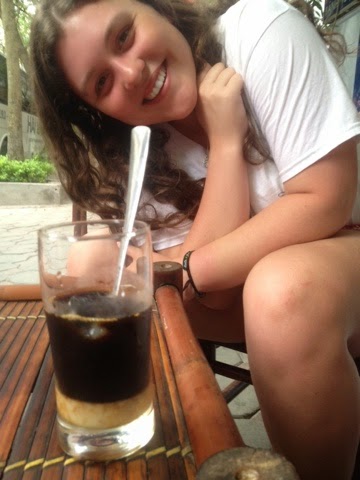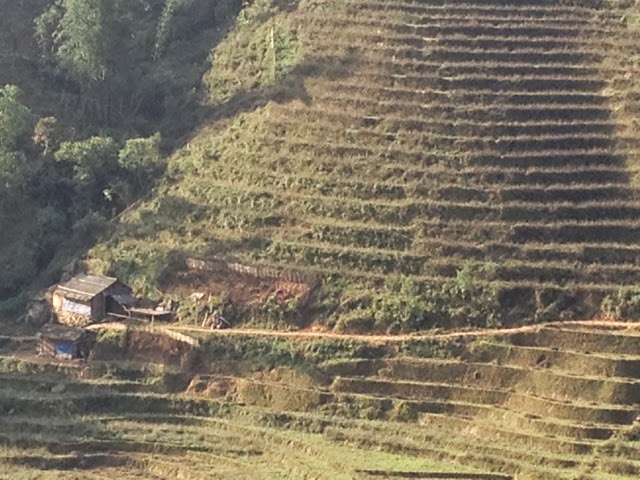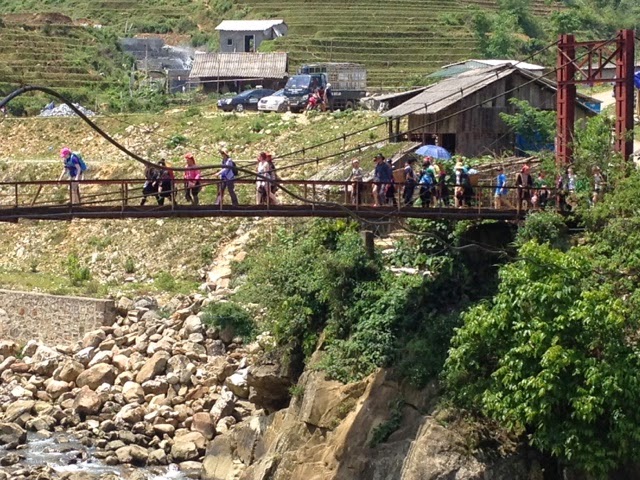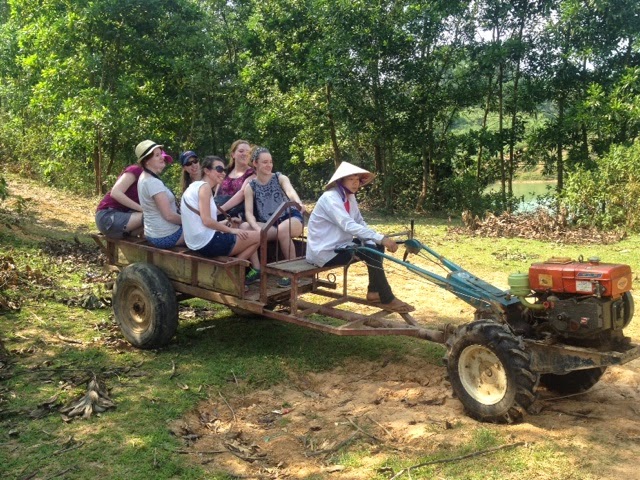After an overnight train ride from Hanoi, we arrived in the mountains in northern Viet Nam, along the border close to China. The train had little compartments with four bunk beds and a little table in each. We jammed in our bags and had a nice little overnight trip. At about 6 in the morning we got off the train and piled into a small bus that took us an hour further into the mountains, to the charming mountain town of Sapa.
Sapa has a lot winding streets and little shops and cafes. There is a small lake at the center, and an open air soccer field/ stadium on the edge of the town. The streets are narrow and charming, and little buildings are tucked wherever they fit. This is the small city where many visitors start their mountain treks and we noticed that among the little shops were a high number of western gear shops like North Face. We left our big bags at a hotel and set out on our own overnight trek with just our small backpacks.
We started walking down one of the smaller roads. It was paved and there were motorcycles that zipped by, and an occasional car passed us, but mostly we were on our own with the water buffalo and our personal entourage of Hmong ladies and girls. These women, of all different ages, were wearing the traditional black embroidered clothing of the Hmong people. Small black hats or silver hair jewelry. Black pants that came below the knee. Shin wraps. Simple jackets that tied in front like martial arts jackets, but these were black with colorful embroidered trim on the facing and banded on the sleeves. They carried large woven baskets or babies on there backs, and some carried umbrellas against the sun. As they walked with us they talked and smiled and laughed with us, helping us as we left the road onto increasingly challenging paths. They pointed out indigo flowers and edible plants and stopped with us as we took photos of the amazing views.
While we were mainly walking down into a large valley, the path was pretty intense in some spots. It was muddy in places, rocky, in spots there were rivulets of water cutting across or down the path. We had to step up onto hillocks and large rocks, past jutting strands of bamboo or tree roots, and the path cut back and forth and up and down as we made our way through it. Around us, we could see the curved terraces of rice paddies, and the small ponds and reservoirs for the water. The terraces banked up the mountainsides as far up as could be reached. The trees and bamboo stands were mixed in with the small garden patches. There were small wood houses and a few larger concrete houses every now and then. Buffalo were working or eating, tended by small boys. Birds and giant butterflies swooped around us. It was humid and the moisture in the air gave everything the sense of being in the mist. It was like being in a cloud at some points.
We stopped for several breaks, where the Hmong ladies showed us their crafts for us to buy. Some of them made us little gifts made of indigo flowers woven with leaves. Little Hmong girls tried selling us colorful woven bracelets.
For lunch we stopped in the main Hmong village, along the main river in the valley. It had a small narrow old bridge, with small houses and a few larger shops along the bank on one side. There was a mill and a water pump building, and several homes had been turned into small restaurants. We ate a lunch of French bread, cucumber, tomato, eggs, apples, and bananas. More ladies and girls approached to sell us traditional crafts. It was interesting--most of the crafts were entirely hand made and embroidered, but these Hmong ladies were also starting to sell some machine made and embroidered pieces in the traditional style as well. Our guide said this area is entirely new to tourism, and before ten years ago, this was an inaccessible area. More and more Hmong families are starting to make part of their living selling crafts, but it's not fully accepted yet, which is why it's only the women who sell crafts. The men still do traditional work. The Hmong are a minority here in Viet Nam, and their culture and language is distinctly different.
In the afternoon we walked through several other small villages and past the valley school to get to the house where we stayed overnight. This was one of the larger traditional houses, with a large main space with two loft areas that are open to the main area below. In each of the four corners of the main area is a large built-in bed with a curtain for privacy. There was a shower and a toilet in separate rooms at the back, clearly added later. On one side wall was a set of cupboards and a TV, with a green hammock hanging in front. Otherwise there was no furniture. Built into one side of the house was the kitchen, which was dark and smokey. The food was cooked by an open fire on the floor, with no vent. The host mother chopped and cooked our entire dinner on the floor in her kitchen. Outside, there were several low tables where we sat in plastic stacking chairs under the bamboo roof cover. Roosters stalked around us, strutting and menacing each other. A mother hen with tiny baby chicks mingled with us, and several funny small chickens with oversize legs pecked for stray food. One little lost chick was practically adopted by our group. There was a friendly dog and several small girls who we played with. We gave them yoyos and other toys and some of us played with the girls off and on for hours.
After an amazing dinner outside, we went to bed. Mats were set up in the loft, each with its own mosquito net tucked around it. It got cool overnight, almost cold even. At one point it started to rain. Around 4 in the morning, the roosters started to crow. Loud. Aggressive. Again and again. Birds sang. Cicadas chirped. The house cats meowed, and the house began to stir. As I write this most of the students are still sleeping, although Meg, Ashley, and Lauren are up petting the dogs and looking out over the valley as it rains. Sophie just joined us and the house mother is bringing out coffee and tea. It's going to be a wet day as we walk back. Our plan is to swim in a mountain stream, but with today's rain we may not need to. We'll be overnight on another train tonight as we leave the mountains. It's going to be hard to leave.
























































